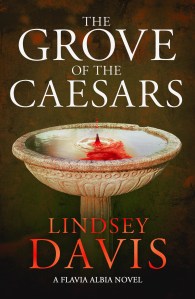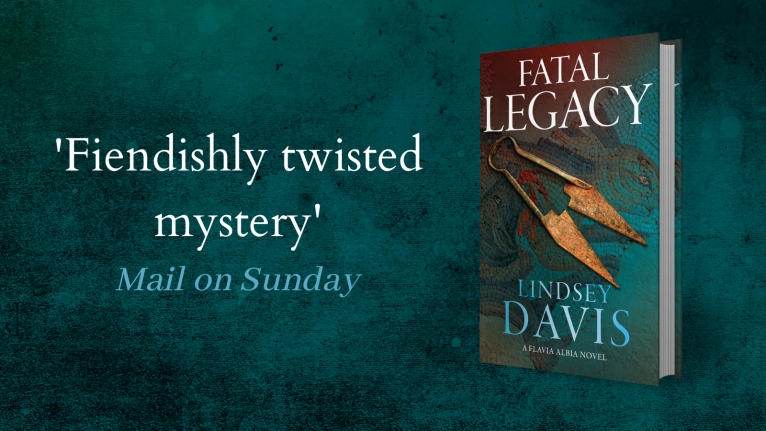Don’t Go to the Grove: Lindsey Davis on the inspiration behind The Grove of the Caesars

The Grove of the Caesars, was intended to explore gardens – a regular haunt of serial killers of course! I pay attention to both, but I prefer an oblique approach, if only to worry my editor. So quite early on Flavia Albia learns that something peculiar is happening with mysterious scrolls, which someone may be trying to fake. And this may be to feed the market among avid collectors.
Gornia, the antique porter at Falco’s dodgy auction house, tells her: ‘Scrolls that are said to be “missing” command a premium. You know what collectors are like about the chance to own something nobody else has. News of a lost scroll drives them into a frenzy. They drool, they need to gloat over it alone at home, they want to be the first to have it on a shelf.’
I confess this theme appealed to me because I have long felt uneasy about why people want to have books signed. The hopeful answer is they have enjoyed my sparky talk at an event so want a souvenir. Perhaps there is a frisson if you know the author in person has handled this copy, and the signature proves it. That’s nice. Don’t think I knock it.
Many years ago, however, doubt crept in because book collectors specifically did not want personalised copies. There was a fervid craze for ‘signed firsts’, particularly coming from America. But I noticed when I visited Spain that readers seemed bemused when I offered to sign copies, they just wanted to come and say hello. Or indeed, Ola. This was much nicer than behaviour at some British and US events, which even led me to put a warning note on my website: At first collectors of first editions were welcome. Later I began to view them with reserve. Some collectors brazenly tell me they have not read a word. Dealers are trading – lucratively – in something I produced to give a different kind of pleasure. Professional dealers sometimes exploit the fact I believe them to be readers. The words ‘just a signature please’ mean the book is to be sold on. If you want me to like you, ask for a dedication so I know you really want it for yourself or to give as a gift.
That’s the mania Albia encounters. It happened. Wealthy Romans were avid collectors of literature and art, and a bookseller tells Albia about the dark side: ‘Possessing literature for study was no longer enough. The goal was to acquire all the literature in the world and stuff it into your book cupboards. A private individual of worth had to have shelves groaning with rare works, works his friends might never have heard of, works they would marvel at, drooling with jealousy, whenever he showed off his collection. People were purchasing ghastly scrolls they would never read, simply in order to own more than anyone else.’
As her informant goes on then yes, I started to have fun with it as a writer: ‘Collectors wanted to boast they had the only existing copy of some ancient piece that was significant in intellectual thought or, worse, they wanted an autographed manuscript that a well-known author had personally owned. They were desperate for scribbled annotations by Thucydides, a ring-mark where Sophocles had stood his wine cup, a bent stylus and the oil lamp Homer wrote by. (Oh dear, how irritating: Homer was blind, so better call it Aristotle’s.)’
Archaeologically, I have another interest in book collections. One of the houses destroyed by the eruption of Vesuvius is called (by us) The Villa of the Papyri. Thought to have been owned by Julius Caesar’s father-in-law, this huge beautiful villa contained both Greek and Latin libraries, and there is evidence that piles of scrolls had been prepared for evacuation, a job that was unfinished when the pyroclastic flows began to thump in. Over the years many people have been desperate to unroll the remaining carbonised scrolls, destroying some in the process. Scientifically, more recent attempts have been fascinating. It is hoped that long-lost works by ancient authors will be discovered…
My readers will expect me to toy with that idea, perhaps naughtily. I have doubts about the Herculaneum library because 1) I fear the books that were left behind may have been abandoned simply because they were duds, since it is always possible Calpurnius Piso collected his scrolls by the yard to fill cupboards impressively. And 2) this was his holiday home; did it contain the equivalent of those shelves that some of us remember from 1950’s seaside boarding houses? All those battered copies of Readers’ Digests, novels by properly forgotten authors, a Noddy book with the last five pages missing and the Observer Book of Mushrooms… Look, somebody has to say it!
Trust me – or if not me, the satirical Flavia Albia.
© Lindsey Davis 2020
The next gripping mystery in the Flavia Albia series is out now.







